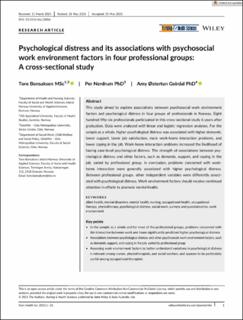Psychological distress and its associations with psychosocial work environment factors in four professional groups: a cross-sectional study
Peer reviewed, Journal article
Published version
Date
2021Metadata
Show full item recordCollections
Abstract
This study aimed to explore associations between psychosocial work environment factors and psychological distress in four groups of professionals in Norway. Eight hundred fifty-six professionals participated in this cross-sectional study 6 years after graduation. Data were analyzed with linear and logistic regression analyses. For the sample as a whole, higher psychological distress was associated with higher demands, lower support, lower job satisfaction, more work-home interaction problems, and lower coping in the job. Work-home interaction problems increased the likelihood of having case-level psychological distress. The strength of associations between psychological distress and other factors, such as demands, support, and coping in the job, varied by professional group. In conclusion, problems concerned with work-home interaction were generally associated with higher psychological distress. Between professional groups, other independent variables were differently associated with psychological distress. Work environment factors should receive continued attention in efforts to promote mental health.
Key points
In the sample as a whole and for most of the professional groups, problems concerned with the interaction between work and home significantly predicted higher psychological distress
Associations between psychological distress and other psychosocial work environment factors, such as demands, support, and coping in the job, varied by professional group
Assessing work environment factors to better understand variations in psychological distress is relevant among nurses, physiotherapists, and social workers, and appears to be particularly useful among occupational therapists

